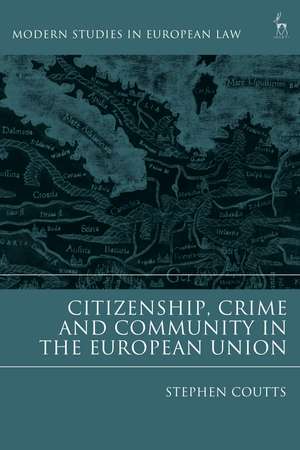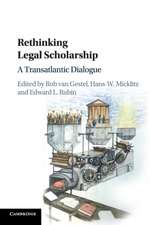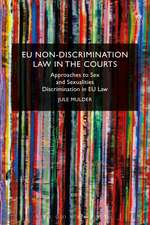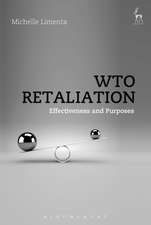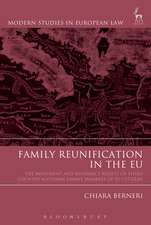Citizenship, Crime and Community in the European Union: Modern Studies in European Law
Autor Stephen Couttsen Limba Engleză Hardback – 18 sep 2019
| Toate formatele și edițiile | Preț | Express |
|---|---|---|
| Paperback (1) | 237.93 lei 6-8 săpt. | |
| Bloomsbury Publishing – 7 apr 2021 | 237.93 lei 6-8 săpt. | |
| Hardback (1) | 634.53 lei 6-8 săpt. | |
| Bloomsbury Publishing – 18 sep 2019 | 634.53 lei 6-8 săpt. |
Din seria Modern Studies in European Law
- 30%
 Preț: 575.75 lei
Preț: 575.75 lei - 24%
 Preț: 440.21 lei
Preț: 440.21 lei - 31%
 Preț: 594.77 lei
Preț: 594.77 lei - 30%
 Preț: 570.22 lei
Preț: 570.22 lei -
 Preț: 181.55 lei
Preț: 181.55 lei - 30%
 Preț: 541.93 lei
Preț: 541.93 lei - 30%
 Preț: 507.97 lei
Preț: 507.97 lei - 30%
 Preț: 790.77 lei
Preț: 790.77 lei - 34%
 Preț: 509.45 lei
Preț: 509.45 lei - 30%
 Preț: 511.64 lei
Preț: 511.64 lei - 19%
 Preț: 296.91 lei
Preț: 296.91 lei - 30%
 Preț: 571.34 lei
Preț: 571.34 lei - 19%
 Preț: 296.72 lei
Preț: 296.72 lei - 11%
 Preț: 375.73 lei
Preț: 375.73 lei - 30%
 Preț: 539.57 lei
Preț: 539.57 lei - 30%
 Preț: 595.65 lei
Preț: 595.65 lei - 27%
 Preț: 475.10 lei
Preț: 475.10 lei - 30%
 Preț: 572.80 lei
Preț: 572.80 lei - 30%
 Preț: 721.14 lei
Preț: 721.14 lei - 18%
 Preț: 320.53 lei
Preț: 320.53 lei - 18%
 Preț: 321.66 lei
Preț: 321.66 lei - 30%
 Preț: 600.57 lei
Preț: 600.57 lei - 19%
 Preț: 317.21 lei
Preț: 317.21 lei - 30%
 Preț: 571.34 lei
Preț: 571.34 lei -
 Preț: 464.01 lei
Preț: 464.01 lei -
 Preț: 239.77 lei
Preț: 239.77 lei - 30%
 Preț: 538.03 lei
Preț: 538.03 lei - 23%
 Preț: 418.50 lei
Preț: 418.50 lei - 29%
 Preț: 587.97 lei
Preț: 587.97 lei - 30%
 Preț: 774.62 lei
Preț: 774.62 lei - 30%
 Preț: 570.43 lei
Preț: 570.43 lei - 30%
 Preț: 574.10 lei
Preț: 574.10 lei - 28%
 Preț: 495.80 lei
Preț: 495.80 lei - 30%
 Preț: 575.33 lei
Preț: 575.33 lei - 30%
 Preț: 571.24 lei
Preț: 571.24 lei - 30%
 Preț: 510.34 lei
Preț: 510.34 lei - 20%
 Preț: 219.19 lei
Preț: 219.19 lei - 30%
 Preț: 601.69 lei
Preț: 601.69 lei - 30%
 Preț: 513.60 lei
Preț: 513.60 lei - 18%
 Preț: 305.72 lei
Preț: 305.72 lei - 30%
 Preț: 972.83 lei
Preț: 972.83 lei - 30%
 Preț: 515.24 lei
Preț: 515.24 lei - 30%
 Preț: 539.99 lei
Preț: 539.99 lei - 30%
 Preț: 570.83 lei
Preț: 570.83 lei - 30%
 Preț: 571.82 lei
Preț: 571.82 lei - 29%
 Preț: 554.35 lei
Preț: 554.35 lei - 30%
 Preț: 572.06 lei
Preț: 572.06 lei - 13%
 Preț: 258.15 lei
Preț: 258.15 lei - 30%
 Preț: 574.59 lei
Preț: 574.59 lei
Preț: 634.53 lei
Preț vechi: 773.81 lei
-18% Nou
Puncte Express: 952
Preț estimativ în valută:
121.42€ • 127.09$ • 101.06£
121.42€ • 127.09$ • 101.06£
Carte tipărită la comandă
Livrare economică 31 martie-14 aprilie
Preluare comenzi: 021 569.72.76
Specificații
ISBN-13: 9781509915361
ISBN-10: 1509915362
Pagini: 264
Dimensiuni: 156 x 234 x 25 mm
Greutate: 0.52 kg
Editura: Bloomsbury Publishing
Colecția Hart Publishing
Seria Modern Studies in European Law
Locul publicării:London, United Kingdom
ISBN-10: 1509915362
Pagini: 264
Dimensiuni: 156 x 234 x 25 mm
Greutate: 0.52 kg
Editura: Bloomsbury Publishing
Colecția Hart Publishing
Seria Modern Studies in European Law
Locul publicării:London, United Kingdom
Caracteristici
Offers an innovative approach to the study of EU citizenship from the perspective of EU criminal law
Notă biografică
Stephen Coutts is a Lecturer in Law at University College Cork.
Cuprins
1. Citizenship, Crime and Community in the European Union IntroductionCitizenship, Crime and Community: A Communitarian Account of the Criminal Law The Role of the European Union in Criminal Law Citizenship in the Union - A Short History Conclusion: Method and Structure PART IEU CITIZENSHIP: BETWEEN TRANSNATIONAL AND SUPRANATIONAL2. The Transnational Dimension of EU Citizenship IntroductionFree Movement and Transnational Citizenship as a Status of Autonomy Names and Civil Status Family Reunification Non-discrimination and Transnational Citizenship as a Status of Integration Union Citizenship and as a Status of Integration and the Court of Justice EU Citizenship and as a Status of Integration and the Legislature Conclusion: EU Citizenship as a Transnational Status - Between Autonomy and Integration 3. The Supranational Dimension of EU Citizenship IntroductionThe Establishment of an Autonomous Supranational Status: Rottmann and Zambrano Retrenchment: An Ill-Defined and Insubstantial Substance The Re-emergence of Supranational Citizenship Conclusion: A Right to a Place and a Place of Rights PART IISOCIAL INTEGRATION AND CRIME: INCLUSION AND EXCLUSION4. Social Integration - I. Rehabilitation and Inclusion Introduction: Rehabilitation and Social Integration The Transformation of the Nationality Exception Subject of the Exception: From Nationals to EU Citizens Justification: From Nationality to Rehabilitation The Framework Decision on the Transfer of Sentences External Transfer and the Principle of Social Integration Conclusion: National Responsibility for a Supranational Interest 5. Social Integration - II. Wrongdoing and a Supranational Duty of Respect Introduction: Integration, Rights and Duties Crime as Wrongdoing: Expulsion The Traditional View: Public Policy as Risk Minimisation Public Security as Values Wrongdoing and Integration: Residence Rights Conclusion: A Supranational Duty of Respect towards National Communities National Communities A Supranational Duty PART IIIAN AREA OF JUSTICE: SHARED ENFORCEMENT AND SHARED RECOGNITION OF NATIONAL WRONGS6. An Area of Justice - I. The European Arrest Warrant as a Transnational Calling to Account: Shared Citizenship, Shared Rights and Shared Wrongs Introduction: Shared Enforcement Legitimising Criminal Law: Three Dimensions Legitimising Shared Enforcement I: Shared Citizenship Abolition of the Nationality Exemption Union Citizenship and a Single Area of Justice Legitimising Shared Enforcement II: Shared Wrongs Abolition of Double Criminality Legitimising Shared Enforcement III: Supranational Rights Legitimacy and Rights Conclusion: Transnational Enforcement in a Supranational Space 7. An Area of Justice - II. A Transnational Ne Bis in Idem Principle IntroductionInterpretation of Finality in Light of Free Movement: A Single Status Strict Application of Mutual Recognition A Substantive Assessment of the Merits of the Case Interpretation of Sameness in Light of Free Movement: A Single Space Consequences of an Interpretation in Light of Free Movement: A Multilevelled Calling to Account PART IVSUPRANATIONAL WRONGS8. Supranational Public Wrongs: The Limitations and Possibilities of a European Community IntroductionStructural Limitations on an EU Supranational Community Articulation of Public Wrongs - Limited Scope for EU Criminalisation Communication of Public Wrongs: EU Criminal Law as Multilevelled The Union Cannot Directly Impose Criminal Liability Operating within National Criminal Justice Systems The Emergence of Supranational Public Wrongs European Public Goods European Public Values Framing National Criminal Law: Supranational Wrongs and Shared Wrongs Conclusion Conclusion: EU Citizenship, Criminal Law and the Restructuring of Community Complementing Union Citizenship Rights Duties Values The Restructuring Political Community in the European Union: Between National, Transnational and Supranational The Primacy of National Communities National Wrongs in Transnational Processes Supranational Implications - Shared Rights, Shared Wrongs and Shared Punishment
